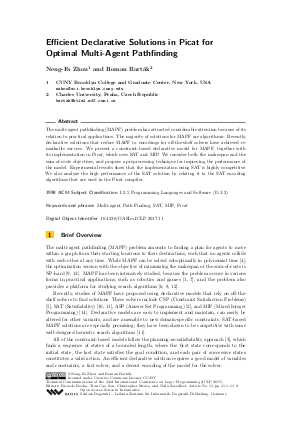Efficient Declarative Solutions in Picat for Optimal Multi-Agent Pathfinding
Authors Neng-Fa Zhou, Roman Bartak
-
Part of:
Volume:
Technical Communications of the 33rd International Conference on Logic Programming (ICLP 2017)
Part of: Series: Open Access Series in Informatics (OASIcs)
Part of: Conference: International Conference on Logic Programming (ICLP) - License:
 Creative Commons Attribution 3.0 Unported license
Creative Commons Attribution 3.0 Unported license
- Publication Date: 2018-02-14
File

PDF
OASIcs.ICLP.2017.11.pdf
- Filesize: 255 kB
- 2 pages
Document Identifiers
Subject Classification
Keywords
- Multi-agent Path Finding
- SAT
- MIP
- Picat
Metrics
- Access Statistics
-
Total Accesses (updated on a weekly basis)
0PDF Downloads0Metadata Views
Abstract
The multi-agent pathfinding (MAPF) problem has attracted considerable attention because of its relation to practical applications. The majority of solutions for MAPF are algorithmic. Recently, declarative solutions that reduce MAPF to encodings for off-the-shelf solvers have achieved remarkable success. We present a constraint-based declarative model for MAPF, together with its implementation in Picat, which uses SAT and MIP. We consider both the makespan and the sum-of-costs objectives, and propose a preprocessing technique for improving the performance of the model. Experimental results show that the implementation using SAT is highly competitive. We also analyze the high performance of the SAT solution by relating it to the SAT encoding algorithms that are used in the Picat compiler.
Cite As Get BibTex
Neng-Fa Zhou and Roman Bartak. Efficient Declarative Solutions in Picat for Optimal Multi-Agent Pathfinding. In Technical Communications of the 33rd International Conference on Logic Programming (ICLP 2017). Open Access Series in Informatics (OASIcs), Volume 58, pp. 11:1-11:2, Schloss Dagstuhl – Leibniz-Zentrum für Informatik (2018)
https://doi.org/10.4230/OASIcs.ICLP.2017.11
BibTex
@InProceedings{zhou_et_al:OASIcs.ICLP.2017.11,
author = {Zhou, Neng-Fa and Bartak, Roman},
title = {{Efficient Declarative Solutions in Picat for Optimal Multi-Agent Pathfinding}},
booktitle = {Technical Communications of the 33rd International Conference on Logic Programming (ICLP 2017)},
pages = {11:1--11:2},
series = {Open Access Series in Informatics (OASIcs)},
ISBN = {978-3-95977-058-3},
ISSN = {2190-6807},
year = {2018},
volume = {58},
editor = {Rocha, Ricardo and Son, Tran Cao and Mears, Christopher and Saeedloei, Neda},
publisher = {Schloss Dagstuhl -- Leibniz-Zentrum f{\"u}r Informatik},
address = {Dagstuhl, Germany},
URL = {https://drops.dagstuhl.de/entities/document/10.4230/OASIcs.ICLP.2017.11},
URN = {urn:nbn:de:0030-drops-84595},
doi = {10.4230/OASIcs.ICLP.2017.11},
annote = {Keywords: Multi-agent Path Finding, SAT, MIP, Picat}
}
